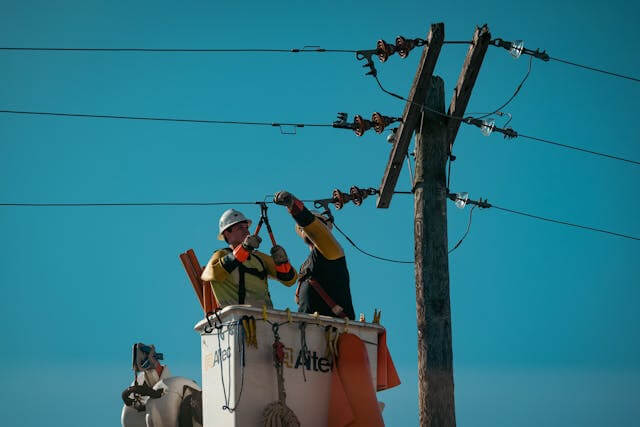
In the electrical industry, having the right equipment can make or break your efficiency and safety on the job. Whether you’re troubleshooting a tricky circuit, installing complex systems, or performing routine maintenance, each task demands precision and reliability. It’s not just about getting the job done; it’s about getting it done right and safely.
This guide is designed to help you navigate the essential tools and safety gear that every electrical professional should have in their arsenal.
Safety Gear: Protecting Yourself on the Job
Safety is important in the electrical industry. From head to toe, you need to be shielded from potential hazards.
Safety Glasses Your eyes need protection from debris, dust, and electrical sparks. Safety glasses provide essential eye protection so you can see clearly while staying safe. Choose glasses that are comfortable and offer a good fit, so you can wear them for extended periods without discomfort.
Insulated Gloves Handling electrical components requires special gloves to protect your hands from electric shocks. Insulated gloves provide a barrier between you and live electrical parts, reducing the risk of injury. Make sure to choose gloves that fit well and provide the necessary insulation for the voltage levels you work with.
Hard Hats Protecting your head is crucial when working in environments where falling objects and electrical hazards are common. If you’re looking for hard hats for your workers, Custom Hard Hats offers a range of hard hats that not only provide protection but can also be customized with your company logo or name, adding a professional touch to your safety gear. These hard hats are built to withstand tough environments, helping you stay safe on the job.
Protective Footwear The right footwear protects your feet from falling objects and electrical hazards. Electrical industry professionals should opt for boots that offer both impact resistance and electrical insulation. Look for boots with non-slip soles to prevent slips and falls on the job site.
Tools of the Trade: Must-Have Electrical Tools
Having the right tools can make your job easier and more efficient. Here are some must-have tools for every electrical professional.
Multimeter A multimeter is essential for measuring voltage, current, and resistance. It helps diagnose electrical problems quickly and accurately, allowing you to troubleshoot issues effectively. Look for a multimeter that is easy to use and has clear, readable displays.
Wire Strippers Wire strippers are used to strip the insulation from electrical wires, making it easier to prepare wires for connections. They come in various sizes, so choose one that matches the wire gauges you typically work with. Wire strippers with adjustable blades can handle multiple wire sizes, adding versatility to your toolkit.
Screwdrivers and Nut Drivers Screwdrivers and nut drivers are fundamental for fastening and loosening screws and nuts. A set of insulated screwdrivers is particularly useful for working safely with electrical components. Nut drivers provide better torque and control when dealing with bolts and nuts.
Pliers Pliers come in various types, such as needle-nose, diagonal, and lineman’s pliers. Each type serves a different purpose, from gripping and twisting wires to cutting and shaping them. A good set of pliers is indispensable for any electrical professional.
Advanced Tools: Enhancing Your Efficiency
For more advanced tasks, specialized tools can significantly boost your efficiency and precision. These tools are designed to tackle specific challenges and streamline your workflow.
Circuit Analyzers Circuit analyzers help identify issues within electrical circuits by providing detailed information about the circuit’s performance. They can detect problems such as improper wiring, voltage drops, and circuit faults, making troubleshooting faster and more accurate.
Cable Pullers When dealing with long lengths of wire, cable pullers are invaluable. They assist in pulling cables through conduits, saving time and effort. Cable pullers come in various sizes and types, so choose one that fits your specific needs.
Voltage Testers Voltage testers are simple yet effective tools for checking whether a wire or device is live. They provide an added layer of safety before starting any electrical work. Voltage testers come in various forms, from pen-style testers to more advanced models with digital displays.
Personal Protective Equipment (PPE)
Beyond basic safety gear, additional personal protective equipment (PPE) can further protect you from job-related hazards. PPE is important for minimizing the risk of injury and maintaining a safe working environment.
Arc Flash Clothing Arc flash clothing is designed to protect against high-energy electrical arcs. These garments are made from flame-resistant materials that provide a barrier between you and potential arc flashes. Wearing arc flash clothing minimizes the risk of severe burns and other injuries.
Face Shields Face shields offer full-face protection from flying debris and electrical sparks. They are essential when working with high-voltage equipment or in environments where there is a risk of explosive sparks. Choose face shields that are adjustable and comfortable to wear for extended periods.
Hearing Protection Electrical work can be noisy, especially when using power tools. Prolonged exposure to loud noises can lead to hearing damage. Hearing protection, such as earplugs or earmuffs, helps prevent long-term hearing damage by reducing noise levels.
Keeping Organized: Tool Storage Solutions
Proper tool storage solutions help keep your workspace tidy and your tools protected.
Tool Belts Tool belts keep your most-used tools handy, allowing you to move freely without constantly searching for your equipment. A well-organized tool belt can save you time and make your work more efficient.
Tool Bags and Boxes Investing in quality tool bags and boxes help keep your tools organized and protected. Tool bags are great for transporting tools to and from job sites, while tool boxes provide a sturdy and secure place to store your equipment.
Labeling and Inventory Systems Keeping an inventory of your tools and labeling them prevents loss and ensures you always know where your equipment is.
Having the right equipment is crucial for electrical industry professionals. From essential safety gear to must-have tools and advanced equipment, each item plays a vital role in your day-to-day tasks. Prioritize safety, stay organized, and maintain your tools so they serve you well for years to come.
Investing in quality equipment not only enhances your efficiency but also ensures you can tackle any job with confidence. Happy working!
















Leave a Reply